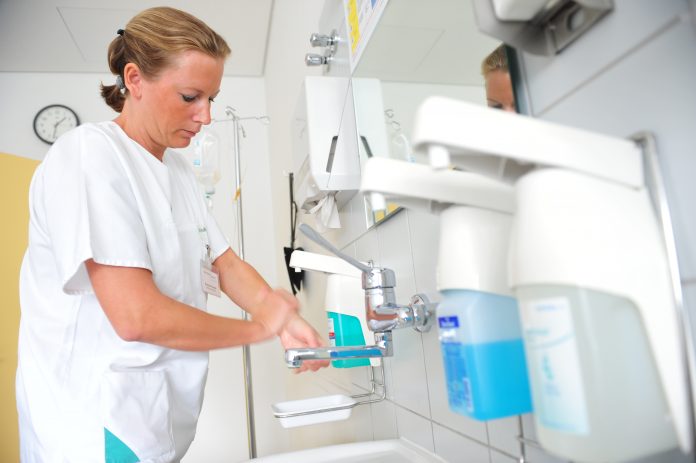Chris Wakefield, Vice President at GOJO Industries-Europe Ltd, highlights how hand hygiene systems reduce the spread of healthcare-associated infection (HCAI)
It is estimated that 300,000 patients a year in England acquire a healthcare associated infection (HCAI) as a result of care within the NHS. Such infections draw large attention from patients, regulatory bodies and the media. Not only because of the magnitude of the problem – after all, they are associated with morbidity, mortality and the financial cost of treatment – but, also, because most are preventable.
Despite being avoidable, HCAIs continue to present a major threat to our public health. They are particularly difficult to eliminate due to the speed and ease that they can be transmitted – and because of their long-life span. Did you know, for example, that MRSA can live up to nine weeks, whilst C.Diff spores can live up to five months? Or that they can be spread through both direct and indirect contact?
Studies have shown that contaminated hands can sequentially transfer some viruses to up to seven surfaces, and that fourteen people can be contaminated by touching the same object one after the other. Perhaps it’s not surprising then, that research indicates that you have a 50/50 chance of picking up a dangerous pathogen anytime you touch anything or anyone in a hospital.
Such outbreaks can have serious repercussions; including the increased risk to the lives of vulnerable patients, disruption of services and reduced clinical activity, such as the enforced closure of hospital wards, cancelled admissions and delayed discharges. There is also the cost of treatment to factor.
Indeed, a report by the National Audit Office estimated that a reduction in the rates of MRSA bloodstream infections saved the NHS in England between £45 million-£59 million in treatment costs between 2003/4 and 2008/9. It also identified that by reducing the rate of C. difficile infections, between £97 million-£204 million was saved in treatment costs between 2006/7 and 2007/8.
Going back to basics
A great deal of scientific research has shown that, if properly implemented, hand hygiene is the single most important, easiest and cost-effective means of reducing the prevalence of HCAIs and the spread of antimicrobial resistance. In fact, research shows it can cut the number of HCAI cases by up to 50%. Several other studies have also demonstrated that handwashing virtually eradicates the carriage of MRSA which invariably occurs on the hands of healthcare professionals working in intensive care units. An increase in handwashing adherence has also been found to be accompanied by a fall in MRSA rates.
In order to reduce the spread of illness, everyone has to engage with hand hygiene practices – not only healthcare workers, who already make this a part of their daily lives, but visitors and patients too. As a founder member of the World Health Organization (WHO) Private Organizations for Patient Safety group, GOJO is a strong advocate of the ‘total solution’ approach to making hand hygiene second nature to everyone in a healthcare setting. We believe that, to successfully change behaviour, a triple-pronged approach is required.
Firstly, handwashing facilities must be accessible and dispensers easy to use. The WHO recommends that an adequate number of appropriately positioned hand hygiene facilities should be readily available at the point of care.
Secondly, the high frequency with which healthcare workers clean their hands means that the formulations must be gentle yet effective against germs, complying with key hospital norms EN 1500, EN 14476 and EN 12791. Studies have also shown that using an alcohol-based hand sanitising rub can improve hand hygiene practice, since it is quicker, is microbiologically more effective and is less irritating to skin than traditional hand washing with soap and water.
Finally, eye-catching signage is very effective as a prompt, especially at key germ hot-spots such as washrooms and waiting areas. Hand hygiene facilities must remain well-stocked and maintained at all times too.
Getting smart
Although evidence supports a ‘back to basics’ approach, digital innovation also has a role to play. GOJO has spent many years developing advanced formulations and high-tech dispensers, and has recently harnessed revolutionary smart technology to create its SMARTLINK™ Electronic Monitoring Solutions. These two mobile apps are a smarter way to help reduce the maintenance time spent on dispensers, and measure hand hygiene performance – ultimately helping to prevent the spread of germs.
Combining the latest technology with the simple act of hand hygiene, and working together to put effective systems in place, we can reduce the spread of HCAIs. GOJO, the leading global producer of skin health and hygiene solutions for away-from-home settings, is your specialist partner in healthcare hygiene.
For a tailored, effective, total solution for your setting, or for more information, please call +44 (0)1908 588444,
email infouk@GOJO.com or visit www.GOJO.com
References
1. https://www.nice.org.uk/guidance/qs61/chapter/introduction
2. Hata B et al. Clin Infect Dis 2004; 39:1182 | Kramer A et al. BMC Infect Dis 2006; 6:130 | Havill NL. et al. Infect Control Hosp Epidemiol 2014; 35:445 | Weber DJ et al. Infect Control Hosp Epidermiol 2015.
3. Barker J, Vipond IB, Bloomfield SF. J Hosp Infect 2004,58:42-494 Stiefel U et al. Infect Control Hosp Edipdemiol 2011; 32:185.
4. 2008 SDA Clean Hands Report Card® sponsored by the Soap and Detergent Association.
5. 24 &25 https://www.ncbi.nlm.nih.gov/pmc/articles/PMC3249958/#ref1
6. 26 https://www.ncbi.nlm.nih.gov/pmc/articles/PMC3249958/#ref1
7. 2,3 & 35 https://www.ncbi.nlm.nih.gov/pmc/articles/PMC3249958/#ref1
Kerrie Doughty
Trade Marketing & Communications Manager
GOJO Industries-Europe
Tel: +44 (0)1908588457
infouk@gojo.com
www.GOJO.com
www.twitter.com/GOJO_Hcare
www.twitter.com/GOJO_Europe
*Please note: This is a commercial profile











